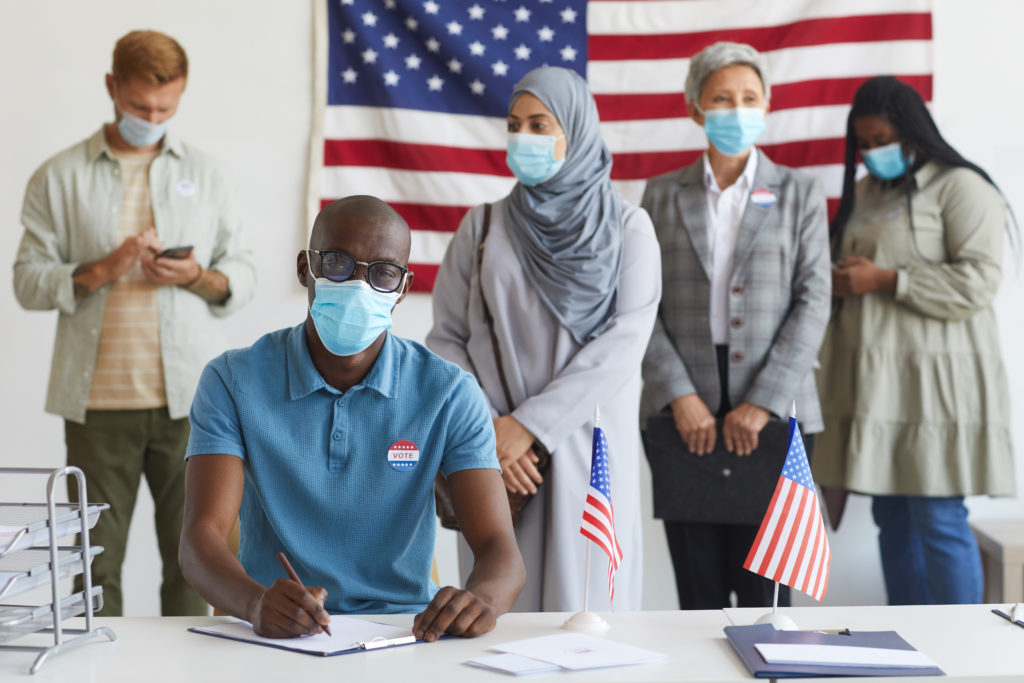The 2020 election is shaping up to be an historic event. We are now just days away from Election Day, and already, many political commentators are expecting to see record voter turnout. This is a great thing, because the more people who vote, the more voices that are heard.
Having a Criminal Record is Not a Barrier to Voting in Michigan

All of us at Safe & Just Michigan want to remind you that in Michigan, having a criminal record does not prevent you from voting unless you are currently incarcerated and serving a sentence. That means that:
- If you are formerly incarcerated … you can vote!
- If you are on probation or parole … you can vote!
- If you still owe court-ordered restitution, fines or fees … you can vote!
- If you are in jail awaiting adjudication … you can vote!
- If charges were filed against you but later dropped … you can vote!
Thousands of poll workers and volunteers are already gearing up to make sure everything runs smoothly on Election Day. There’s no reason to believe anything will go wrong. However, with unusually high turnout expected, we thought this would be a good time to go over some unusual situations you might encounter at polling locations, what you should know about them, and how you can ask for help if you need it.
THE MOST IMPORTANT THINGS TO KNOW:
- It is now too late to mail in absentee ballots. Because of the time it takes to move mail, there is no guarantee that an absentee ballot mailed now will reach your county clerk by Election Day. For that reason, people who still have an absentee ballot are encouraged to walk it into their city or township clerk’s office or deposit in an official drop box.
- If you can’t or don’t want to personally deliver your absentee ballot, you still can vote in person if you bring your ballot with you to your polling location on Election Day and exchange it for a standard ballot.
- If you requested an absentee ballot but didn’t receive it or lost it, you can still vote. Go to your polling location on Election Day and tell them what happened. You may be offered a “challenge ballot.” If you aren’t offered one, request one.
- If you are refused an opportunity to vote or encounter any other problem, call the voter protection hotline at 866.OUR.VOTE (English), 888.VE.Y.VOTA (Spanish), 844.YALLA.US (Arabic) or 888.API.VOTE (Asian Languages). The voter hotlines are sponsored by the Election Protection Coalition, a nonpartisan coalition of organizations such as the NAACP and the National Bar Association that do not promote any party or candidate — their only aim is to ensure a fair voting process.
Special Situations You May Encounter on Election Day

Here are some of the more situations or people you may encounter on Election Day — some are more common than others:
Poll Watcher:
A poll watcher is a credentialed person who is authorized to observe the process of checking in to vote, applying for ballots and turning in ballots once they are completed. They cannot go with you to the voting booth (unless a voter with a disability specifically asks for a poll watcher’s assistance). Poll watchers can be members of a political party or campaign or may be nonpartisan. Poll watchers have participated in all elections prior to this one and if you see a poll watcher, it is not a cause for alarm.
Poll Challenger:
A poll challenger is similar to a poll watcher, except that they can challenge the accuracy of a person’s voting status. This could be for one of several reasons, such as:
- The address on a person’s picture ID doesn’t match the address on the voter roll.
- A person who turns requests a ballot doesn’t appear to be at least 18 years old.
- Has a good reason to believe a voter is not a US citizen.
- Has a good reason to believe a voter is not registered to vote.
- A person was issued an absentee ballot, but then turns up to vote in person.
- NOTE: a challenge cannot be made on the basis of race, nationality, religion, ability to speak English or other factors other than the ones listed above.
Poll challengers are only permitted to speak with a poll inspectors and other poll workers, not directly with voters. It is important to note that even if a poll challenger flags your ballot application, you will still be offered an opportunity to vote using a “challenge ballot.” (read below) Like poll watchers, poll challengers are credentialed people who may be affiliated with a party or campaign, or could be nonpartisan, and poll challengers have participated in all previous elections. Seeing a poll challenger is not a cause for alarm.
Challenge Ballot:
When a person shows up at a polling location to vote, and their name is located on the voter rolls, a poll inspector or poll challenger may question his or her voting status for a limited number of reasons (see above, “Poll Challenger”). When this happens, a poll inspector will ask you to take an oath swearing that you are a qualified voter. Once you take the oath, you will be asked a few questions to ascertain your eligibility to vote, such as your age, address, citizenship and voter registration. If you answer the questions to the satisfaction of the poll inspector, you will be offered a challenge ballot. If you refuse the oath and/or the questions, you will not be permitted to vote.
A challenge ballot looks exactly like a regular ballot, except it has a piece of tape with the letter ‘C’ on it. Challenge ballots will be tabulated along with all other ballots cast in that precinct at the end of the night. The only time a challenge ballot would be handled differently is in the event of a recount. At that point, challenge ballots will be pulled aside, and the voting status of the ballots in question will be investigated to ensure the ballots are valid.
If this happens to you, you are asked to contact the voter protection hotline at 866.OUR.VOTE (English), 888.VE.Y.VOTA (Spanish), 844.YALLA.US (Arabic) or 888.API.VOTE (Asian Languages) to let them know the time and voting location where this happened, so that they can ensure your vote was handled properly.
Provisional Ballot:

If you show up to vote but cannot be found on the voter roll, or you can’t provide a picture ID to confirm your identity, you will be offered a provisional ballot. You will mark your voting choices like you normally would, but instead of putting your ballot through a tabulator or including it with the rest of the ballots, the ballot will be put aside in a Provisional Ballot Form envelope and not counted at the end of Election Day. You then have SIX DAYS to provide your city or township clerk with the picture identification or proof of residency that was missing on Election Day. Once that requirement has been satisfied, your vote will be tallied and included with the other votes tallied on election night.
If this happens to you, you are asked to contact the voter protection hotline at 866.OUR.VOTE (English), 888.VE.Y.VOTA (Spanish), 844.YALLA.US (Arabic) or 888.API.VOTE (Asian Languages) to let them know the time and voting location where this happened, so that they can ensure your vote was handled properly.
A Special Note on Open Carry at the Polls
Earlier this month, Michigan Secretary of State Jocelyn Benson issued guidance stating that the open carry of firearms would not be allowed at polling locations on Election Day. As of this writing, that rule had been successfully challenged in court, allowing for the open carry of rifles and guns inside polling places. That cold change between now and Election Day as the matter continues to be appealed in the courts.
However, it is important to know that no matter which way the courts decide, voter intimidation is illegal. If you feel that voters are being intimidated away from voting or are being harassed into voting for a particular candidate, you are urged to report the incident as an urgent matter. If possible, please notify the poll workers immediately. Then notify the voter protection hotline at 866.OUR.VOTE (English), 888.VE.Y.VOTA (Spanish), 844.YALLA.US (Arabic) or 888.API.VOTE (Asian Languages) and tell them about the incident of voter intimidation so that they can handle it. The Election Protection Committee includes lawyers who will respond to protect voters’ rights.



